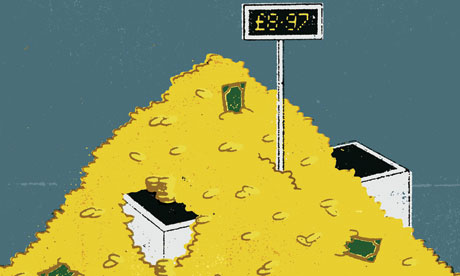
Recently, as part of a personal experiment in the psychology of money, I spent almost a month trying to make every purchase I could in hard cash. So before I go further, I should apologise if you were one of the people who found themselves stuck behind me in supermarket queues while I fished through my rucksack for the little beige envelopes in which I'd stashed that week's notes and coins. (More on these shortly.) Some time ago, in the US, Visa ran a series of ads based on the premise that people who don't pay with plastic infuriate other customers; the slogan was, "because money shouldn't slow you down". I can report that this fury is real. Even checkout staff didn't seem grateful to receive the exact change, counted out in scores of tiny coins, even though this procedure almost always took me less than 15 minutes.
My purpose was to see if I'd spend more frugally. It's hardly news that people spend more freely with credit cards than when they're using cash. But until recently, researchers who study the psychology of money had assumed this was for one reason only: "payment decoupling", a fancy term for the fact that credit cards mean you get to enjoy your new pair of jeans, or Learjet, weeks or months before you have to part with the money. Newer studies, though, add a fascinating wrinkle: spending actual cash feels uniquely painful even when decoupling's not an issue. When experimental subjects are given free cash and invited to spend some of it, they do so more conservatively than when given credit vouchers – even when they're told they'll get their change in cash either way. "Payment modes differ in the transparency… with which individuals can feel the outflow of money," one team of psychologists explains, "with cash being the most transparent payment mode." All non-cash forms of payment feel, to some extent, like Monopoly bank notes. So does foreign currency, another study suggests: you spend more abroad because it doesn't feel so real.
The standard advice for responsible money management is to automate everything you can: that way, you'll never miss a bill, and you can sock away savings the moment your pay cheque arrives. But a few personal finance gurus, mindful of these belt-tightening times, propose the opposite: going back to cash (or, in the case of utilities bills, paying by cheque). Cash does slow you down, but in a good way, reintroducing a useful friction. Merely writing out a cheque for your electricity bill, meanwhile, might be sufficient to trigger a more mindful approach to switching things off. Which brings me to my envelopes. The self-help writer Dave Ramsey is a passionate evangelist for what he calls "the envelopes system": literally divide your discretionary spending among envelopes, he advises – one for groceries, one for transport, etcetera – so you can watch as your funds run out. (Ramsey's book The Total Money Makeover, it should be noted, also contains a fair amount of passionate evangelism for Jesus Christ – but his financial advice is belief-neutral.)
My own experiment yielded mixed results. Too many things just can't be bought with cash: ebooks and advance-purchase train tickets both broke my system. But I did spend about 10% less than in the same part of the previous month. Plus I helped numerous strangers in supermarkets learn to become more patient. And you can't put a price on generosity like that.
• oliver.burkeman@theguardian.com; twitter.com/oliverburkeman

